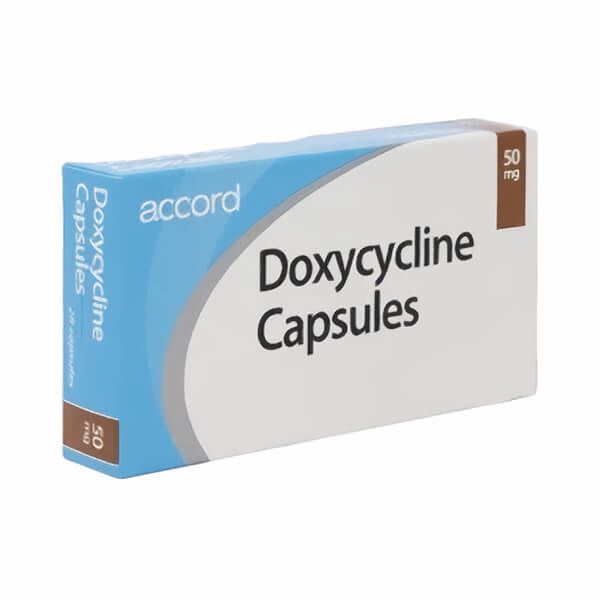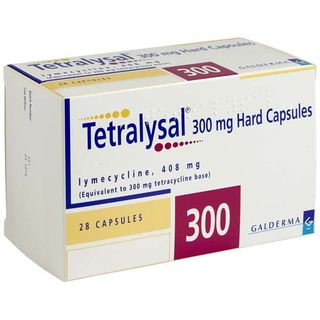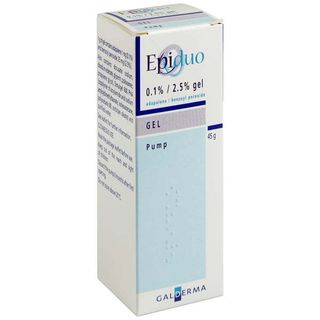

Doxycycline For Acne
- Free standard delivery on orders over £40Spend £40.00 more for free delivery
- Fast, discreet delivery
Delivered in secure, plain packaging on fully tracked delivery from just £2.95
- 100% UK-based pharmacy
Our team of doctors and pharmacists, and our support staff, are all UK-based.
- Free advice and support
Have a question? Telephone support is always free; Monday - Friday, 9am - 5pm.
- We're rated 4.9 out of 5
Based on over 24,000 reviews collected on Google and Reviews.io.
We maintain the highest possible regulation for a UK online pharmacy, ensuring your experience is safe, and confidential.
Doxycycline For Acne
Doxycycline is a prescription-only antibiotic that is commonly used to treat moderate to severe acne vulgaris (acne), a skin condition characterised by pimples, blackheads, and whiteheads.
Like other acne treatments, Doxycycline can take time to show results. Improvement may be seen within 2 weeks, but it may take up to 12 weeks to see the full benefits of the medication. Results are likely to be faster if used with a non-antibiotic topical treatment, such as Skinoren, Acnecide, or Epiduo.
Tired of dealing with the unpleasant, uncomfortable symptoms of acne? A brief online consultation is all it takes to order Doxycycline through The Independent Pharmacy.
This treatment requires an online consultation for review by our medical team. The decision to supply the specific treatment and quantity requested will be based on whether our medical team are satisfied that it will be safe, appropriate, and effective.
Doxycycline For Acne summary
- Type of medicine
- Tetracycline antibiotics
- Works by
- Kills the bacteria that causes acne
- Active ingredient
- Doxycycline Hyclate
- Strength
- 100mg (2 x 50mg)
- Effective within
- Up to 12 weeks
- Pack size
- 56 capsules
- Generic
- Yes
- Use with alcohol
- In moderation
What is Doxycycline?
Doxycycline is a prescription-only oral antibiotic. It is typically prescribed to people with moderate to severe acne that hasn’t responded to other treatment options (such as topical creams or gels containing benzoyl peroxide).
This medication is highly effective in reducing inflammation and clearing the bacteria responsible for acne breakouts. Doxycycline is also used to treat a range of other conditions, such as Chlamydia, Malaria, and Rosacea.
As an acne treatment, Doxycycline is usually taken once or twice a day for several weeks or months. As Doxycycline is an antibiotic, it’s important to take the medication exactly as prescribed, and that you finish your course as directed. This will prevent the development of antibiotic-resistant illnesses.
Does Doxycycline clear up acne?
Doxycycline is highly effective when used to treat moderate to severe acne. The medication works by clearing acne-causing bacteria from the skin, reducing inflammation, and preventing any new bacterial growth.
If you’re suffering from acne, your pharmacist or GP will likely prescribe Doxycycline alongside a facial cream or gel containing benzoyl peroxide (an antiseptic). This is because while Doxycycline does an excellent job at reducing inflammation and bacteria, these aren't the only reasons for an acne breakout.
All acne breakouts begin due to the buildup of excess oils forming a plug (known as a comedo). In the skin pores. Unlike Doxycycline, topical medications can prevent these plugs from forming in the first place.
Long-term use of Doxycycline may lead to antibiotic resistance, so it should be used only as long as it is needed to clear up acne.
How quickly does Doxycycline work for acne?
The effectiveness of Doxycycline for treating acne can vary from person to person. Some people may see improvement in their acne within a few weeks of starting Doxycycline, while it may take several months for others to notice a difference. Treatment usually lasts around 3 to 4 months; however, a dermatologist may prescribe a longer course if needed.
What is the success rate of Doxycycline for acne?
A study from 2007 showed that Doxycycline successfully reduced up to 75% of inflammatory acne lesions and up to 54% of comedones (blackheads and whiteheads).
How should I take Doxycycline for acne?
When taking Doxycycline for acne, it is generally recommended to take two 50mg capsules once daily with food. As with all oral antibiotics, it’s important to take Doxycycline at the same time every day for the entire duration of the prescription.
In general, you can expect your course to last around 3 to 4 months though this may vary, depending on the severity of your acne. Never increase your Doxycycline dosage without consulting your GP or pharmacist first.
Always try to take the capsules while standing or sitting upright, never lying down, and wash the capsules down with a large glass of water.
If you miss a dose of Doxycycline, be sure to take it as soon as you remember. However, if it’s almost time for your next scheduled dose, it’s better to skip the missed dose and continue with your regular dosing schedule. Do not take extra medicine to make up for the missed dose.
Doxycycline treats acne most effectively when taken exactly as prescribed, and your recovery may take longer if you miss doses. Always contact your pharmacist or doctor if you miss more than one dose.
Always complete the entire course of antibiotics as prescribed, even if your acne goes away. This helps to ensure that all the bacteria have been cleared from your pores, and it prevents the development of antibiotic resistance.
Doxycycline ingredients
Each Doxycycline capsule contains 50mg Doxycycline (as hyclate) as the active ingredient.
Each capsule also contains: gelatin, magnesium stearate, shellac glaze, sodium lauryl sulphate, starch, E104, E127, E131, E171, E172 & propylene glycol.
Sources
Doxycycline: Patient Information Leaflet
Doxycycline side effects
Common side effects (affecting around 1 in 10 people) include:
- Nausea
- Vomiting
- Headaches
- Sun sensitivity
Stop taking your treatment and see your doctor immediately if you experience any of the following symptoms that may indicate an allergic reaction:
- Wheezing/difficulty breathing
- Fever
- Swelling of the face, lips, throat, tongue, hands, or feet
- Increased heart rate
- Low blood pressure
- A rash
- Itching
- Diarrhoea
- Cramps
If you experience severe or persistent side effects, it's important to contact your healthcare provider. For a full list of side effects and information about taking Doxycycline, including interactions with other medication, see the Patient Information Leaflet.
Doxycycline warnings
Before deciding to use Doxycycline, you should consider the following warnings.
Do not take Doxycycline if:
- You have ever had an allergic reaction to any of the ingredients listed below.
- You are in or have passed the fourth month of pregnancy, as it may affect the unborn baby. If you become pregnant whilst taking Doxycycline, consult with your doctor as soon as possible.
- You are currently using any oral retinoids.
- You suffer from achlorhydria (an absence of stomach acid) or have had any surgery on the duodenum (upper part of the gut).
You should always consult with your doctor before beginning a course of Doxycycline if you:
- Have liver disease.
- Are predisposed to candidiasis overgrowth.
- Are currently suffering from an oral or vaginal fungal or yeast infection.
- Are currently suffering from a muscle disease.
- Are currently suffering from colitis.
- Experience any oesophageal ulceration or irritation.
- Expose yourself to strong UV light as sunburn can occur more easily.
- Always speak to your doctor if you are taking or have recently taken any other medication as this may interfere with Doxycycline.
What medications should I avoid when taking Doxycycline?
There are several medications that you should avoid taking while using Doxycycline to treat acne. These include:
- Blood thinners: Doxycycline may increase the risk of bleeding when taken with blood thinning medications such as warfarin (Coumadin) or aspirin.
- Retinoids: Doxycycline may increase the risk of skin irritation when taken with retinoids such as isotretinoin (Accutane).
- Oral contraceptives: Doxycycline can make birth control pills less effective.
- Any medication containing calcium, aluminium, magnesium, or iron, such as antacids.
- Antibiotics containing penicillin
Please refer to the Patient Information Leaflet for a full list of warnings. Always inform your doctor or pharmacist of any medications you are currently taking before starting Doxycycline.
Can I take Doxycycline during pregnancy?
Doxycycline is not typically recommended for use during pregnancy due to concerns that it may affect bone growth. If you are pregnant, your GP may suggest alternative treatment options such as erythromycin or topical acne treatments such as benzoyl peroxide.
Does Doxycycline cause weight gain?
It’s understood that Doxycycline may cause weight gain, particularly with prolonged use. Some research suggests that this may be related to the impact of the antibiotic on gut bacteria, which play a role in weight management. If you have any concerns about this, it’s best to speak to your GP before beginning your treatment.
What happens if I miss a dose of Doxycycline?
If you miss a dose of Doxycycline, take it as soon as you remember. However, if it is close to the time for your next dose, do not take the missed dose. Instead, continue with your regular schedule and take your next dose at the usual time.
Do not take extra medicine to make up for the missed dose. If you miss multiple doses, speak with your pharmacist or GP to determine the best course of action. It's important not to miss doses or stop taking Doxycycline early as this can lead to the development of antibiotic-resistant bacteria.
What happens if I overdose on Doxycycline?
An overdose of Doxycycline can be dangerous and may cause severe side effects. If you suspect an overdose, seek medical help right away. The symptoms of an overdose may include:
- Nausea and vomiting
- Diarrhoea
- Loss of appetite
- Abdominal pain
- Dizziness
- Headache
- Drowsiness
- Blurred vision
In severe cases, an overdose may lead to more serious side effects such as:
- Seizures
- Coma
- Kidney damage
- Liver damage
Overdosing on Doxycycline is not known to be fatal when taken alone. However, an overdose of any medication should be considered a medical emergency and treated immediately.
If you experience any side effects after taking Doxycycline, it is important to seek medical attention immediately.
Related Treatments
- Best seller
 Skinoren 20% Cream£15.49140 reviews
Skinoren 20% Cream£15.49140 reviews - Out Of Stock

Tetralysal Capsules
Tetralysal (Lymecycline) 300mg Capsules£17.49225 reviews 
Epiduo
Epiduo & Epiduo Forte Gel£33.0020 reviews
Visit our Doxycycline For Acne page for treatments, advice and FAQs.
Ordering as easy as 1, 2, 3
1. Find the ideal treatment
We can provide over 1099 leading medicines to treat over 94 conditions.
2. Get a free consultation
Our qualified healthcare professionals will assess your condition and needs.
3. Enjoy speedy delivery
And when the time comes to re-order, it'll only take a couple of clicks.